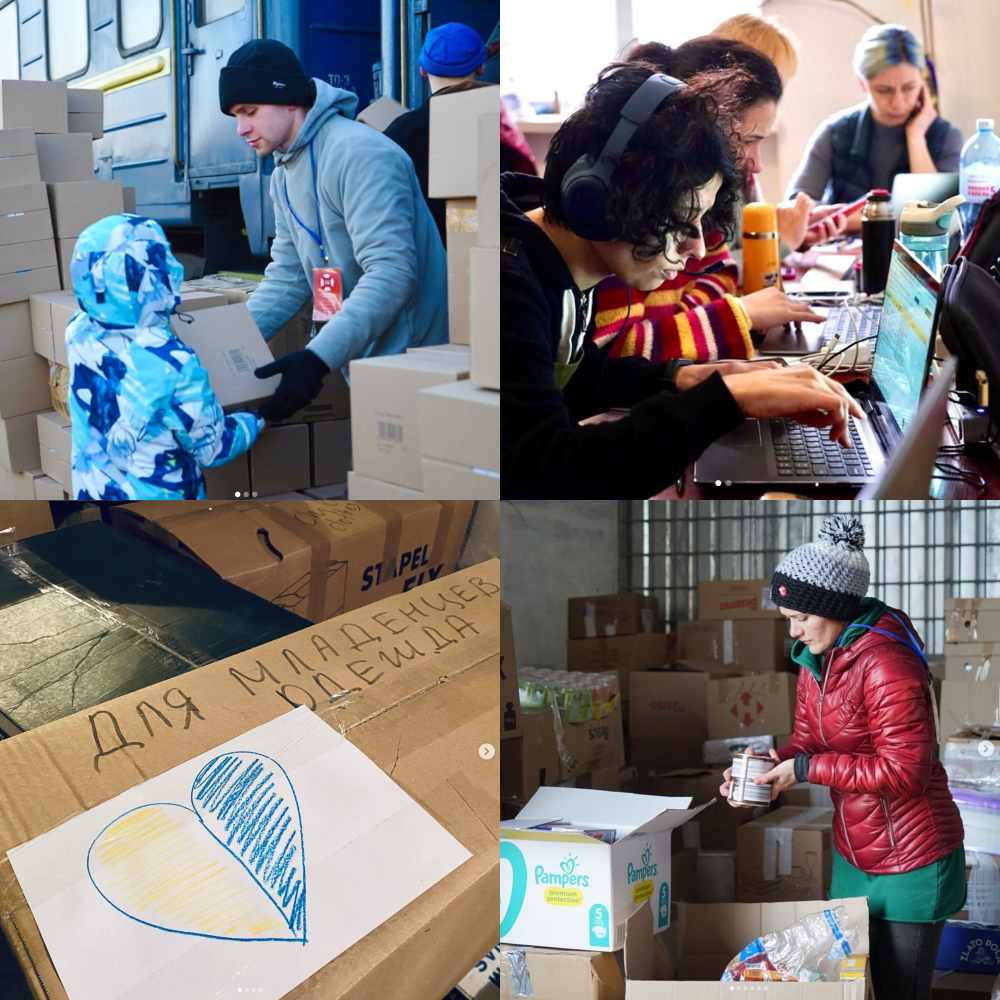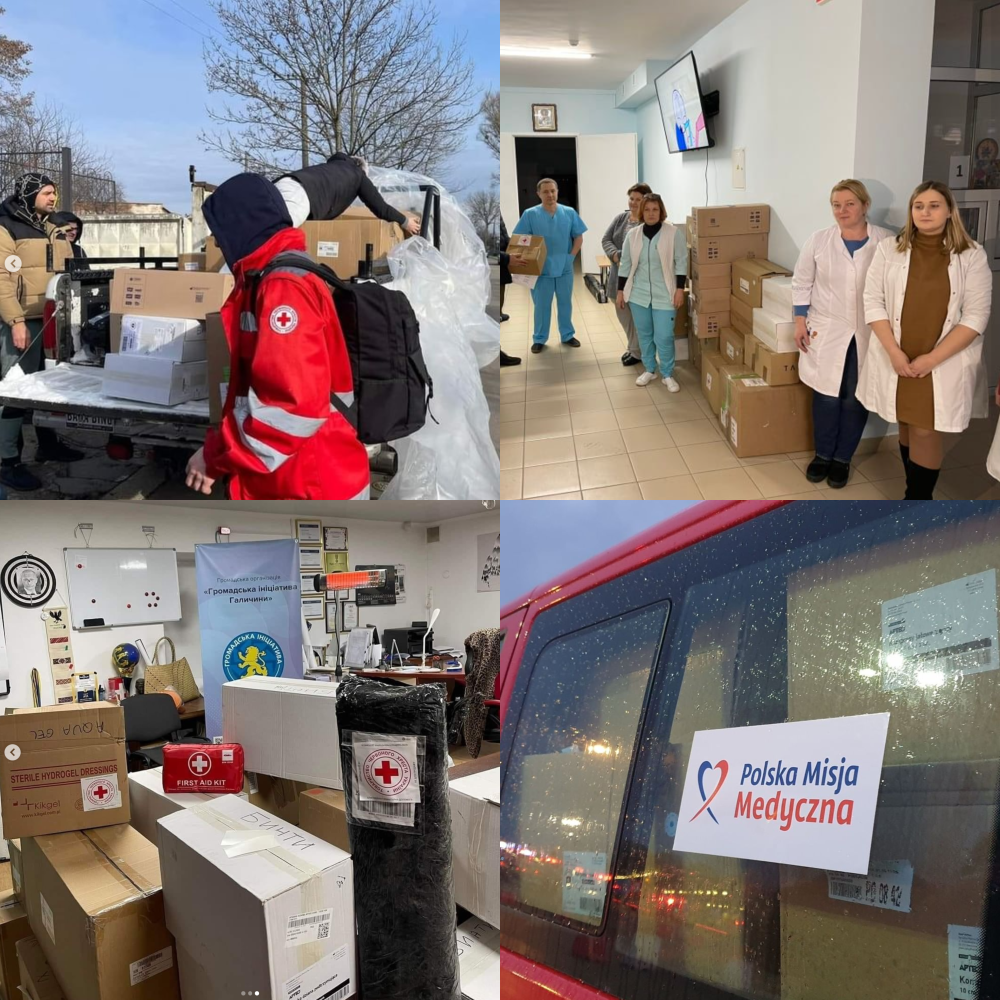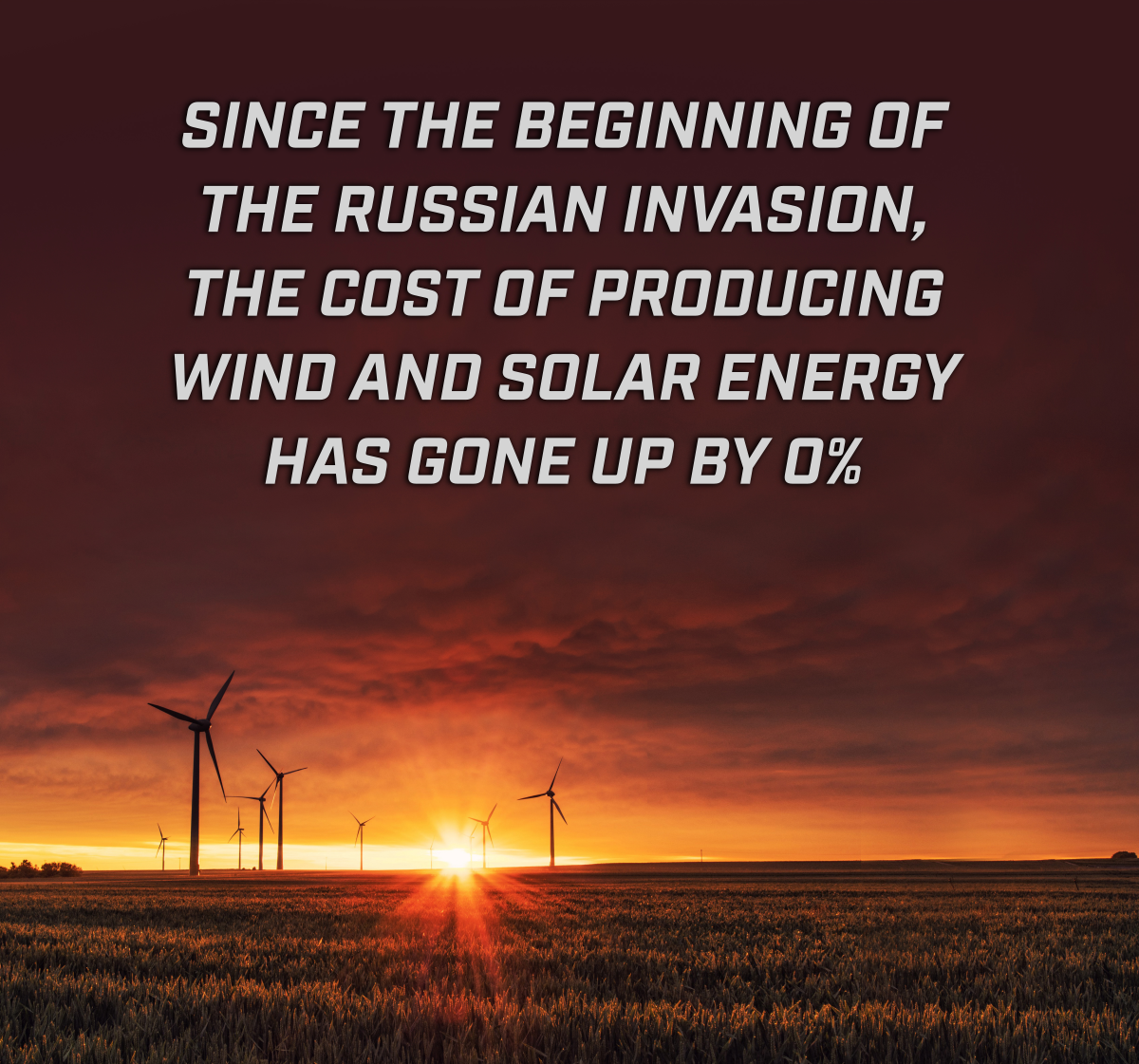This is the members only edition of Future Crunch, a weekly roundup of good news, mindblowing science, and the best bits of the internet (not necessarily in that order). One third of your subscription fee goes to charity.
Give a damn
The last two weeks have felt like November 1989 or September 2001; a sheer kick in the head by history, resurfacing as current affairs. We've all experienced this in our lives, moments when we know we're witnessing something profound unfolding, chapter markers in humanity's meandering path of progress and downfalls. The brutal war in Ukraine is such a marker; a new chapter in the book of human history.
It could be wishful thinking at such an early stage, but the horror of Russia's invasion may turn out to be the opposite of what so many commentators have suggested. Instead of dealing the final blow to a wobbly rules-based global order, it may, paradoxically, have strengthened it. In the words of Neoma's Nathan Gardels, "by crossing the line in Ukraine, Putin may have reinforced it everywhere else."
On one side stands Putin, on the other, all the things that unite the rest of us. Freedom, dignity, respect, human rights, rule of law, solidarity, self-organization, social responsibility, equality, freedom of speech, peaceful protest, transparency, accountability, religious freedom, multiculturalism and international law. The global reaction seems to have shown these are still universal values, and still worth fighting for.
We were still trying to get our heads around it last week, which is why we missed an issue. Our apologies. We've been following every newsflash, but the cycle moves so fast it's impossible to keep up. The whole thing still feels unbelievable, or at least, it does outside Ukraine. For the millions who've fled across the border and for the many millions more who remain, the bombs, the fighting and the suffering are all too real.
Thanks to you, we're in a position to make a small difference. After some careful research, we've settled on two charities. The first is the Polish Medical Mission, who is shipping urgent medical supplies deep into the war zone, and is opening a field hospital in Ukraine too. The second is Vostok SOS, who are supplying the most necessary things for refugees - clothes, canned food, medicines, hygiene products, baby food, mattresses and bed linen.
We're sending each organisation $3,000. All of the funds will be spent directly on purchasing and distributing supplies to Ukrainians. If you'd like to see what they're doing on the ground, check out the links to their social media below. It's a drop in the ocean, but it still helps. Thanks to all of you for making this possible and for your continued support. Actions speak louder than all the words.
Except these five:
Russian warship, go fuck yourself.


Good news you probably didn't hear about
Saudi Arabia has become the fourth country in the WHO’s Eastern Mediterranean Region to eliminate trachoma, the leading infectious cause of blindness. It remains endemic in five countries in the region, but progress has substantially reduced the number of people requiring antibiotic treatment, from 39 million in 2013 to 11 million in 2020. WHO
If you're not from Africa you've probably never heard of bilharzia, the world's most common parasitic infection. It's a debilitating disease caused by a freshwater worm, leading to chronic ill health. New data shows that in 2010, 51 million of sub-Saharan Africa's 223 million school children were infected. By 2019, that number had dropped to 28 million out of 288 million. WHO

A new pregnancy app has been shown to reduce baby death rates among ethnic groups in the UK by a factor of three, after being tested by 20,000 pregnant women. The tool, which uses an algorithm to screen for high-risk women, is already in use at a hospital in London and will be rolled out to 20 other maternal centres over the next two years. BBC
US immigration authorities have released new policies making it easier for children who are victims of abuse to qualify for green cards, finalizing changes first proposed more than a decade ago. Since 2010, more than 130,000 applications have been approved. These new policies will lead to even more vulnerable children being granted residency status. Reuters
Rodrigo Duterte has signed into law a bill raising the age of sexual consent in the Phillipines from 12 to 16. A ‘Romeo and Juliet’ clause will protect young, genuine lovers and the law will close loopholes such as an exemption in cases where victims agreed to marry their abuser. SCMP
After a long history of conflict (how's that for an understatement), several Arab countries are welcoming Jewish people back to their countries. In the UAE a government-led effort has resulted in kosher restaurants, a Jewish centre and a state-financed synagogue, and in 2020 the UAE, Bahrain, Sudan, and Morocco all agreed to normalise relations with Israel. Economist
The UK has pardoned all gay and bisexual men convicted under a law that criminalised same-sex relations until the 1980s. Activists fought for years to remove convictions for the thousands of men who have struggled to find jobs due a criminal record, in a move aimed at righting the wrongs of the past. Global Citizen
Saving the world is cheaper than ruining it
Last seen staggering around on the lawn of Jimmy Carter's White House, energy security is suddenly back. Russia's invasion of Ukraine has shown that fossil fuels, long promoted as reliable, secure sources of energy, are actually the opposite: constantly at the mercy of unpredictable disruptions. The idea of renewables representing 'freedom energy' is suddenly everywhere - and only getting stronger. Other countries after all, can't stop the wind blowing and the sun shining in yours.
This national security paradigm has turned out to be a much better mobilising force than the climate catastrophe paradigm. The speed of change has been astonishing. Shell, Exxon and BP spent decades building inroads to Russia’s fossil-fuel wealth, but in less than 60 hours last week, all announced exits, with no clear path to recoup their billions of dollars of investments. The $11 billion Nord Stream 2 project, a carbon bomb that had paralysed the West for years, is bankrupt, and Russia's prospecting plans in the Arctic looks like they're dead in the water too.
The invasion has brought a wartime energy transition to Europe. The continent’s decades-long timelines for overhauling energy systems that support 440 million people is now being revved up under extraordinary duress. The European Commission has already released a plan to cut most of its reliance on Russian gas by the end of this year, which is insane, considering the continent got 40% of its gas from Russia last year. As the EU's Green Deal chief, Frans Timmermans said, “We are now protecting our vital interest."
Nowhere is this acceleration more apparent than in Germany, a country which imports 65% of its gas from Russia. Europe’s leading economy has pledged to get 100% of its energy from renewables by 2035, bringing forward the previous target by 15 years, and also earmarked $220 billion to fund industrial transformation between now and 2026. In the announcement, German finance minister Christian Lindner described clean energy as, you guessed it, "the energy of freedom”. Reuters

Across the Atlantic, there's also been a marked change in tone too. A ban on Russian gas and oil imports by the Biden administration received bipartisan support and a significant majority of Americans say they're willing to put up with higher prices at the pump. Outside of Washington, California has just increased its renewables target to 72% by 2032, and on the east coast, a record auction for offshore wind leases clearly shows which way the market is going.
Last month the US Bureau of Ocean Energy Management sold 7 GW of leases off the coast of New York and New Jersey. The final winning bids totalled an amazing $4.37 billion, more than nine times the previous US record for offshore wind. In contrast, a sale of oil drilling rights in the Gulf of Mexico late last year attracted only $191.7 million. Grist
Good news from our backyard: the state of Victoria has announced plans for 2GW of offshore wind by 2032, and 9 GW by 2040, after legislation passed last year cleared the way for development. The 10 proposed projects are looking to capitalise on strong wind resources along thousands of kilometres of coastline. Reuters
Meanwhile in China, the head of the National Development and Reform Commision, the country's chief state planner, has announced a plan to build (checks notes) 450 GW of solar, wind and hydro in the Gobi and other desert regions. This is absolutely mindblowing. To put that in perspective: the entire world collectively added 290 GW of renewables in 2021. Reuters
China is also targeting 30 GW of battery storage by 2025, and 100 GW of battery storage and 120 GW of pumped hydro by 2030. That's according to the head of the State Grid Corporation of China. These figures completely blow all previous forecasts for the Asia-Pacific region out of the water, and the impact on the learning curves for storage technologies will be enormous. Energy Storage News
And finally... it's the year 2022 and there are giant floating solar flowers on reservoirs in South Korea.

The only home we've ever known *
Honduras has banned open-pit mining with immediate intervention for existing projects in areas of 'high ecological value'. It’s an unexpected win from a country that has a poor track record of threatening environmental defenders who oppose mining. Honduras joins El Salvador and Costa Rica as countries that have banned open-pit mining in Central America. Mongabay
Chile is creating a new national park, covering 75,000 hectares of the Andes, to protect 386 glaciers that are melting due to climate change. The park is "a fundamental step that our country is taking to combat the destruction of nature" and will also help preserve native flora and animals likes pumas and foxes. France24
The UN has delivered a 'watershed' moment for animal rights, with a historic resolution formally recognising the links between animal welfare and the environmental crisis. Activists have campaigned for this for decades - it ensures greater awareness that how animals are treated affects not just the animals themselves but human health and the health of the environment. Newswire
New Zealand’s national bird is bouncing back from the brink, with the population of the North Island brown kiwi population of 20,000 expected to grow by more than 10% over the next three generations. Conservationists and volunteers have worked for over 30 years to save the flightless bird which struggled to survive the introduction of predators such as stoats, rats, and ferrets. Stuff
Humpback whales will be removed from Australia's threatened-species list. An independent scientific panel deemed the mammals had made a major recovery, after facing near extinction in the 1980s. The whales will still have protection in Australian waters, where it is offence to kill, injure, take, trade, keep, move, or interfere with a humpback. ABC
Basking sharks are now a ‘protected wild animal’ in Ireland thanks to new regulations to prevent hunting or interference with its breeding or resting places. The sharks are the second biggest fish in the world and feed on plankton. Irish waters are home to 15% -20% of the world’s basking shark population. Journal
175 nations came together last week to strike “the most significant environmental multilateral deal since the Paris accord”. Representatives endorsed an end to plastic pollution, with a legally binding pact to address the full life cycle of plastics and a financing model to support lower-income countries. Work now begins on implementing the treaty by 2024. NYT
“Against the backdrop of geopolitical turmoil, the UN Environment Assembly shows multilateral cooperation at its best. Plastic pollution has grown into an epidemic, but with today’s resolution we are officially on track for a cure.”
Espen Barth Eide, President, UNEA-5

Indistinguishable from magic
Happy 50th birthday to Pioneer 10, the only spacecraft heading into interstellar space through the tail of our heliosphere. Launched in 1972, it was the first human-made object to traverse the asteroid belt, visit Jupiter, and use the gas giant as a gravitational slingshot. Also, speaking of satellites, the first batch of images from Landsat 9 have been released and they are absolutely incredible.
No doubt you've heard of the environmental horrors of Bitcoin. A single transaction is equivalent to 77 days of power consumption by the average US household. If you change from proof of work to proof of stake however, the problem disappears. That's exactly what the Ethereum network is planning later this year, and if it pulls it off, crypto will change forever. MIT Tech Review
Scientists from Texas have used machine learning to set a world record for producing algae as biofuel. Thanks to an algorithm that supported cell growth and hindered mutual shading, the team achieved 43 g/m² per day, smashing the DOE's previous target of 25 g/m² per day, and lowering the price to $281 per ton. Corn, the current lowest cost biomass for ethanol, costs $260 per ton. IE
Texas again. Scientists from the University of Texas have redesigned Cas9, a key component of the CRISPR-based gene-editing tool, to be thousands of times less likely to target the wrong stretch of DNA. Dubbed SuperFi-Cas9, the new version is 4,000 times less likely to cut off-target sites but works just as fast as naturally occurring Cas9. Science Daily
This week's sci-fi special: Australian researchers have found a way to get stem cells to turn into bone cells quickly and efficiently, using high-frequency sound waves. “Our device is cheap and simple to use, so could easily be upscaled for treating large numbers of cells simultaneously, vital for effective tissue engineering.” New Atlas
It's been all over the news but we're including it anyway because it's awesome. We are overwhelmed by our good fortune in having located and captured images of Endurance. This is by far the finest wooden shipwreck I have ever seen. It is upright, well proud of the seabed, intact, and in a brilliant state of preservation. NYT
Information superhighway
We have read a LOT of pieces on the war in Ukraine. Sinead O' Sullivan's is our favourite, a love letter to the talented engineers, the academics working on complex issues, the economists who showed realism in the face of populism, the founders of deep tech start-ups, the investors creating long-term value, and the climate scientists looking into a future most of us have not yet understood. The Currency

According to evolutionary anthropologist Anna Machin, love is biological bribery. She says the basis for love is four neurochemicals, but that far from making it cold science, this makes it an even more amazing phenomenon. "The more I study it, the more in awe I am of its complexity in the human species." Nautilus
The true story of a Ukrainian father and son who became the first - and only - Soviet defectors to make it to the West by crossing the icy Bering Strait. A story about the desire for freedom, and so much more too, a voyage in time across ice curtains, cold wars and earth alphabets. The Atavist

Great term from Tim Harford: voltage drop, the dismaying tendency of pilot projects that deliver sensational results to fade at a larger scale. It's not a new idea - the difficulty of scaling is well known to anyone who's ever tried to commercialise something new - but sometimes it's a phenomenon that's hard to explain. This does the job in just two words. FT
Hi everyone, Gus here. Like many I started baking bread during the pandemic. Unlike many though, I'm still doing it, so this one's purely selfish - a deep dive into how flour is made, where it comes from, and why you should almost definitely change the kind you're using. Be warned: this rabbit hole goes deep. You might find yourself shopping for a countertop mill by the end. Eater
And finally, if the news is freaking you out, remember, it's not about you. Here are some tips on sorting out your information diet from Future Crunch brain crush, Oliver Burkeman.
Humankind
The ‘Papa’ of Ukraine
Meet Serge Zevlever, a 62 year-old adoption facilitator from Ukraine who dedicated 25 years of his life to helping orphans, mostly with special needs, find loving homes in America and Canada.
Serg was born in Ukraine and immigrated to the United States with his wife and children as refugees. They settled in St. Louis and Serg became a US citizen, splitting his his time between America and Ukraine, where he led an adoption team out of Kyiv, connecting American and Canadian families with Ukrainian orphans. His speciality was helping orphans with Down Syndrome, special medical needs, and teenagers.
Serg guided thousands of families; representing them in court, helping translate and providing steady support through the emotional roller-coaster of overseas adoption. He fought tirelessly for them, refusing to take ‘no’ for an answer and was often described as “the equivalent of a mob boss in the adoption world”. Underneath his world-worn exterior was a man who loved his job and his fierce devotion to saving the babies and children that most of the world ignored, resulted in the placement of 3,500 children from orphanages in Ukraine into loving overseas families.
Just over two weeks ago, Serge got the last child adopted out of Ukraine and despite his dual citizenship, remained in his homeland to continue rescuing orphans who he knew would become unadoptable under Russian rule. While seeking cover at a bomb shelter with his wife and stepson near their apartment in Kyiv, Serg was shot and killed.
Many of the families and children he helped still refer to Serg as ‘papa’ and his daughter Alisa Sanda believes his greatest reward was seeing children placed into the arms of loving families. “My dad knew what would happen if those kids were not taken and given a good home. He fought for those kids just like every single one was his own.”

OK enough words. We're all done. See you next week (and thanks again for the support).
Gus, Amy and the rest of the FC team

Oh, hold on. One last thing.
For the first time in over two years, Future Crunch is appearing in public. We're going to be speaking on Tuesday 16th March, from 7:00pm - 9:30pm, at the State Library of Victoria. The evening will be hosted by Rwandan-British composer and storyteller Stéphanie Kabanyana Kanyandekwe, and we'll be there to kick things off, talking about adaptation in a world turned upside down.
We'll be joined by the director of Fair Share Fare Dr Jen Rae, who works with communities to develop cultural responses to climate change and improve food access, and musician Ben Opie, who works to democratise live music performance and champion the inclusion of new, diverse voices and audiences in classical music.
If you're in Melbourne, we'd love to see you, it's going to be such a great night out. Tickets are only $35.
An in person event! We can't believe they're finally happening again.
Get tickets here





